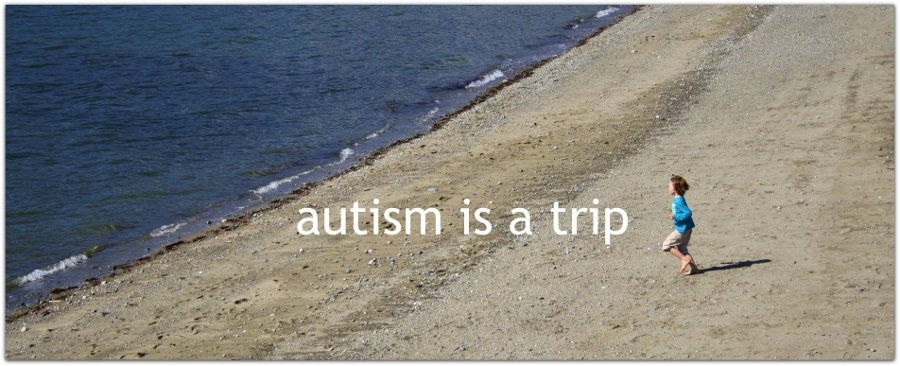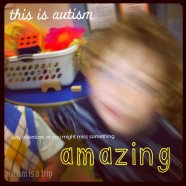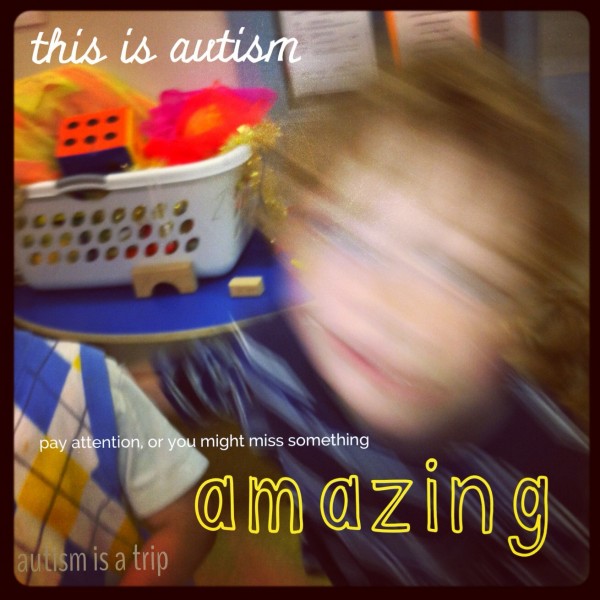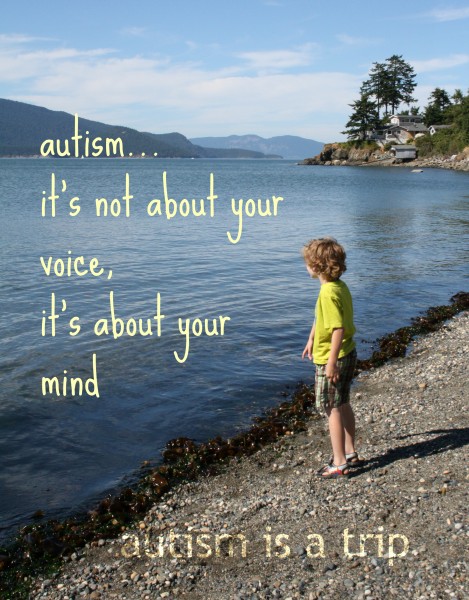"every journey is more fun if you can laugh along the way..."
Be A Friend: What to Do When A Child You Know is Diagnosed
Among family and those I consider close friends (people I have real, off-the-computer relationships with), more than thirty of their children are either on the autism spectrum, suspected of being on it, or have associated behaviours (ADHD, etc). In the last month alone, two dear friends have had a child diagnosed with autism.
Autism is everywhere, and that’s all right. Learning a child actually has autism, however, can be quite a shock.
We suspected Jack had at least a sensory processing disorder, and were actually hoping for an official autism diagnosis. With a diagnosis comes support and interventions.
When the psychiatrist at his evaluation actually suggested autism, though, it was an ice cold smack in the face.
Sometimes, even when you know your child is autistic, it hurts to hear it out loud.
Hearing the words, seeing the actual reports and assessments in your hands… somehow changes the game. You’re no longer on the sidelines, rather, you’re suddenly center field with the ball in your hands. Game on.
So now what?
As the saying goes, there is no rest for the weary. Parents of a newly diagnosed child are suddenly inundated with action plans, financial concerns, and their own, often conflicted, emotions.
And people who want to help. Lots and lots of well-intentioned people.
Parents of autistics are often overwhelmed with good intentions that are not always constructive. Some actually hurt. I doubt most of these folks even realize what they’re doing.
So, I came up with a few suggestions.
Things you should not say or do to a parent with a newly diagnosed child:
1) Express sorrow and/or pity.
The child has not died, and has not been diagnosed with a terminal illness. Autism is a life-long condition, but it’s not a death sentence. Please don’t act as if it is. Sympathy is good, pity is not.
2) Immediately suggest a diet/test/protocol.
Every person with autism is different, and not all respond in the same manner to the same things. The family will likely explore all of their options to find out what will work best for their child.
3) Start forwarding them every single article/email/meme/book that mentions the word autism.
They have just entered this world, and need some time to adjust. Drowning them in autism stories only complicates the situation.
4) Ask what they think caused the child’s autism.
To date, nobody knows what causes autism. There are a multitude of theories, but no concrete evidence, anywhere. Some studies point to genetics, some point to environmental influences, but none have a conclusive answer. Parents do nothing to “cause” their child’s autism, and asking this question passively-aggressively implies they did.
5) Share horror stories.
This is similar to scaring a first-time mom with horrible birth stories. Yes, autistic children wander, are abused in schools, and are open to any number of other terrible things. Just as you shouldn’t talk about how many babies die in a particular form of childbirth to a pregnant mother, don’t start listing off every bad thing that has happened to every autistic child ever. Just don’t.
6) If you’re a parent of an autistic child yourself, don’t smother them with “assistance.”
When the family is ready, they’ll reach out. Think about when your child was first diagnosed, and how you felt. Treat them the same way you wanted to be treated.
Instead, here are some things you definitely can and should do for someone with a newly diagnosed child:
1) Offer words of support.
Instead of an “I’m sorry,” give love and friendship. An “I’m here for you” goes a long way.
2) Wait until you’re asked to give advice/suggestions/help.
Stand back, give them some room to breathe. If you let them know you’re there whenever needed, they’ll come to you. And if they don’t, that’s all right, too. Don’t be offended.
3) If you’re an autism parent (or autistic) yourself, wait until you’re asked to share stories.
I know it’s tempting to share your tales of success and failures in various areas, but there will be plenty of time for that down the line.
4) Stay positive.
But don’t pander. Parents don’t need to hear that “at least” it’s high functioning autism or that s/he can speak, or anything else that minimizes the situation. It’s condescending and unnecessary. Instead, compliment the child. The child is the same today as s/he was before the diagnosis.
5) Ask “how can I help?”
Parents new to autism need some time to process what’s happening with them and their child. Take them a meal, watch their other children for a bit, or simply ask to help with laundry or other household chores. A little gesture or respite goes a long way.
6) Be a friend.
This one should be self-explanatory. Be there when they need you. Lend an ear or a shoulder. Give unconditional love. Autism can be a very isolating thing for everyone involved – knowing there are people to turn to is immeasurable.
Support is the number one thing families of autistics want and need. In any way, large or small, it all helps.
A version of this post originally appeared on redOrbit blogs.
Share this: Twitter | StumbleUpon | Facebook | digg | reddit | eMail Read MoreRunning Man
When you think of autism, what’s the first image that pops into your mind?
(It’s ok, we’re not pc here.)
I’m guessing it’s something along the lines of a child flapping their hands wildly. Or spinning in circles. Or making strange, loud sounds.
In the autism community, we call these “stims.” When somebody is “stimming,” they’re seeking sensory input, or stimulation. Stimming comes in all kinds of forms, often as individual as the person doing it.
Jack likes to run. In the house, in a pattern.
We call it “doing laps.”
When Jack is running laps, he’s in his own world. He has a set pattern, which usually starts at the couch in the living room, takes him through the room into the kitchen, off the fridge (it used to be the sliding glass door, until we finally convinced him that it might hurt to accidentally go through it), down the hall into the front door, and back into the living room, landing with a bounce on the couch.
With barely a breath in between, he’s off again.
He does this for a while, and he’s pretty much in his head the entire time. Meaning, he’s not available for conversation. Or much else, really.
He’s off in autism land.
I finally asked Jack what he’s thinking when he’s running his laps, as I was a bit concerned that he might be doing it out of frustration or anxiety.
“When I run like that, I’m thinking happy thoughts,” he said. “Right now, I’m thinking about Rugrats.”
Ok, then. I pressed him to explain further.
“Sometimes I think happy thoughts, sometimes. I’m walking around, which could give me energy.”
Makes complete sense.
I asked him if he’s upset, or if he just does it.
“I just decide to think happy thoughts.”
I had a feeling that as much as I was gaining a little bit of insight into Jack’s habit, I was starting to annoy him. Still, I pressed on. What makes him happy? What comes to him while he’s doing laps?
“Can I keep that a secret? I don’t want to tell you that.”
Of course. A man needs his secrets. He’ll tell me in his own time.
“Maybe I shouldn’t have said that. Cause I didn’t want that conversation.”
Or not.
Share this: Twitter | StumbleUpon | Facebook | digg | reddit | eMail Read More
Guess What? I Have Autism!
“Hi! I’m Jack. I have autism.”
A sentence I wasn’t sure I was ready to hear. Yet, so pleased to see it exclaimed loudly and proudly.
Two weeks ago my husband David and I told Jack he has autism for the very first time. We’ve never hidden anything from him, we just wanted to wait until we were certain he’d be able to understand the gravity of it all to address it directly.
We discussed it for months in advance, tried to plan out what we wanted to say. And what we didn’t want to say. We decided to wait until the summer, so he would have time to adjust to his new reality unfettered by school stresses. We looked at books, we asked what others had told their children.
Summer came and we still waited. For the right time, the right place, the right… whatever. We finally decided to take him out to lunch alone, where we could have a conversation without his brothers drawing focus. It would be perfect.
And we all know the best laid plans always go according to, well, plan.
The days passed and still no discussion, no lunch date. Then one day we were all sitting around the kitchen table doing arts and crafts and what-have-you. I looked at David, he looked at me and shrugged. It just seemed like a good time.
“Jack, do you know what autism is?”
He wasn’t sure, so we expanded on some things he already knew: people have different likes and dislikes, people don’t all look the same, people think differently.
That’s been a recurring theme in our family for years. Whenever one of the children asks why someone is a certain way, or why somebody likes something they don’t, or any time something is not the same as what they know, we say it.
“People’s lives are different.”
We knew someday Jack (or his brothers) would realize that he’s not like most of the other kids, and we wanted him to know that different is not wrong. It’s not strange. It’s not weird or funny or less than. Different is just different.
We described the spectrum, and how all people who have autism fit somewhere on it, but are not the same. That even within the autism community there are differences, and that’s OK.
We told him that autism is why sometimes sounds are too loud and lights are too bright and the Titan AE theme song drives him nuts (although to be fair, it’s really annoying). Autism is why he has a helper at school, and why he needs to run around in the halls periodically. It’s why he takes melatonin to sleep at night.
It’s also why he wants to know everything about every subject that interests him, and wants to share it all with anyone within earshot. It’s not why he’s curious, but it’s probably why he’s curiouser.
So when we said the words “you have autism” to Jack, and explained what we meant, he wasn’t upset. He wasn’t scared or troubled in any way. He was quite the opposite.
I’m pretty certain Jack believes he has some sort of super powers.
Which, of course, he does. Duh.
So, without further ado, Jack’s thoughts on autism.
On the concept of a spectrum, and where he falls on it (we told him he started in the middle, and now he’s toward the high-functioning end):
“It’s hard to read if you’re in the middle of the spectrum. You just have to show your parents the words.”
“If you’re way past schedule on learning, nothing will stop you from learning again and again and again to get to the other end of the spectrum.”
Jack does understand that not everyone can move from one end to the other, although his main concern about those individuals is that they may not be able to have sex properly to have children. He’s quite interested in the mechanics of having babies at the moment.
I’m certain he’ll have more to say on the non-sex aspect at a later date.
On the fact that he was born prematurely, and how that may have contributed to his autism (his correlation, not ours):
“If you’re early (premature) you have a lot more time to learn. If you’re past schedule (post-dates, like his brothers), you don’t have as much time to learn.”
So, according to Jack, he’s got one up on his brothers because he was born six weeks premature.
On early intervention (he started services when he was 23 months old), and the important role parents have in the therapy process:
“You (parents) helped me learn. You also brought someone else over to help teach me to learn.”
“It’s all because of my parents that other people came and taught me. So parents do help out with learning, not just school and other classes. Mostly parents. But mostly school.”
Um, thanks?
“And you learn mostly everything at university.”
OK then.
Some random thoughts on autism:
“I couldn’t walk when I was born, and it’s because of the spectrum.”
Hm, probably not the case.
“I know how to read, so I’m really good at autism.”
I guess so?
We finished up by asking him how he felt now that he knows about autism. Turns out, he thinks it’s pretty cool.
“I think that having autism is great. Of course, what do you know?”
Not much, apparently.
“Do you like autism a lot?”
Yes, yes I do, in fact.
“Well, thank you!”
You’re quite welcome, little man, it’s been my pleasure.
When his aunt and cousins came over later in the day, he ran up to them and gleefully exclaimed, “guess what?!? I have autism!”
Let the celebrations begin.
And, as is his wont, Jack summed up autism in the most eloquent way possible. From the mouths of babes and all, words of wisdom:
“I think it (autism) helps me want to do lots of things. It’s great for the mind, because it can help you do lots of things.”
And finally:
“Some people (with autism) can’t talk – it’s not about your voice, it’s about your mind.”
I couldn’t have said it better myself.
***********************************************************
Next up in this series – what Jack’s brothers have to say about autism.
Share this: Twitter | StumbleUpon | Facebook | digg | reddit | eMail Read More












